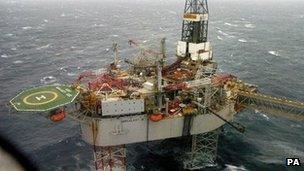Scottish independence: Fiscal Commission backs oil fund for Scotland
- Published

North Sea oil is a multi-billion pound industry
A team of economic advisers appointed by the Scottish government has said an oil fund should be established in the event of independence.
The Fiscal Commission Working Group concluded, external that there should be both a short-term stabilisation fund and a long-term savings fund.
But pro-Union Better Together said you "can't save money while you are borrowing money".
The people of Scotland will vote in the independence referendum next year.
On Thursday, 18 September, 2014, they will be asked the straight yes/no question: "Should Scotland be an independent country."
The commission's 85-page report made a number recommendations including;
A short-term stabilisation fund being established to manage year-on-year changes in oil and gas tax revenue and providing a stable and predictable revenue stream for future governments.
The government in an independent Scotland should ensure transparency in relation to the mechanisms used to forecast North Sea revenue, manage transfers into a stabilisation fund and integrate the fund into the wider fiscal framework.
An independent Scottish Fiscal Commission should oversee the processes of forecasting and transfers into the funds.
The group also said the Scottish government should look to establishing a long-term savings fund to provide a permanent revenue stream for future generations.
Crawford Beveridge, who is in charge of the fiscal working group, said the oil and gas industry had made a significant contribution to Scotland's economy for four decades and would represent a valuable asset in the future.
He explained: "This report sets out how both a short-term stabilisation fund and a long-term savings fund could be incorporated into the fiscal framework of an independent Scotland, potentially as early as 2017-18.
"This could help to maximise the economic opportunity that Scotland's oil and gas wealth presents and ensure that it provides a lasting benefit for future generations."
But the head of Better Together, Alistair Darling, said it was not possible to spend the same money more than once.
In a blog written after the publication, external of the commission's report, he said: "Currently oil revenues make up just 2% of the UK tax take, but an independent Scotland would rely on North Sea revenues for anything up to 20% of our tax revenues. So spending on public services would depend on the ups and downs of world oil prices.
"The solution to this, say the SNP, is to establish this stablisation fund.
'Impartial advice'
"They suggest planning public finances on the basis of a particular oil price level of production and then, in the years when the oil price exceeds that level, save some of that money to fill the gap in public spending that we would face when the price drops.
"It sounds fair enough until you remember that even in the years of highest oil prices in the last decade Scotland has still run a fiscal deficit."
The Fiscal Commission Working Group was established in March 2012 and given the brief by the Scottish government to provide "impartial technical advice on the economic choices, challenges and opportunities for Scotland post-independence".
Scotland's Finance Secretary John Swinney welcomed the report of the commission.
He said: "Their work highlights the significant opportunities that Scotland's oil and gas wealth presents and answers the key questions that have been raised about how this wealth should be managed in an independent Scotland.
"Firstly, the Working Group have outlined how a stabilisation fund, into which higher than forecast oil and gas revenues are deposited, would minimise North Sea revenue volatility from changes in oil prices.
"Secondly, the report also sets out how an independent Scotland could invest in a longer-term savings fund to ensure that Scotland's oil wealth provided a lasting benefit to the country."
Mr Swinney explained that the purpose of the two funds was different.
The stabilisation fund would provide the mechanism for smoothing out the fluctuations in oil and gas prices, he said.
The minister added that a long-term savings fund could be set up when "borrowing is manageable and debt is on a downward path as a proportion of national wealth".
A separate report out on Wednesday appeared to underline the volatility of oil and gas receipts. HM Revenue and Customs put out "experimental" figures for the first time which estimated the tax take from the four nations of the United Kingdom.
If Scotland is given a geographical share of oil and gas revenues, it was reckoned to have had 8.3% of all tax revenues in 1999-2000.
With rising oil prices and tax take, that rose to 10.2% of the UK's tax in 2008-09, or £44.8bn, but it fell again to 9% in 2012-13, or £42.4bn. That is ahead of the 8.4% share of the UK's population.
The figures also indicated that the share of oil and gas revenue allocated to Scotland fell from 86% in 1999-2000 to 68% last year, with the rest in English waters.
The Scottish government does not agree with the Treasury's assumptions about allocation of resources, preferring to use those calculated by Professor Alex Kemp, the industry expert at Aberdeen University.
John Swinney, the Scottish finance secretary, commented: "The fact that Scotland contributes more taxes per head of population than the UK has been shown to have been the case in each and every year over the last three decades".